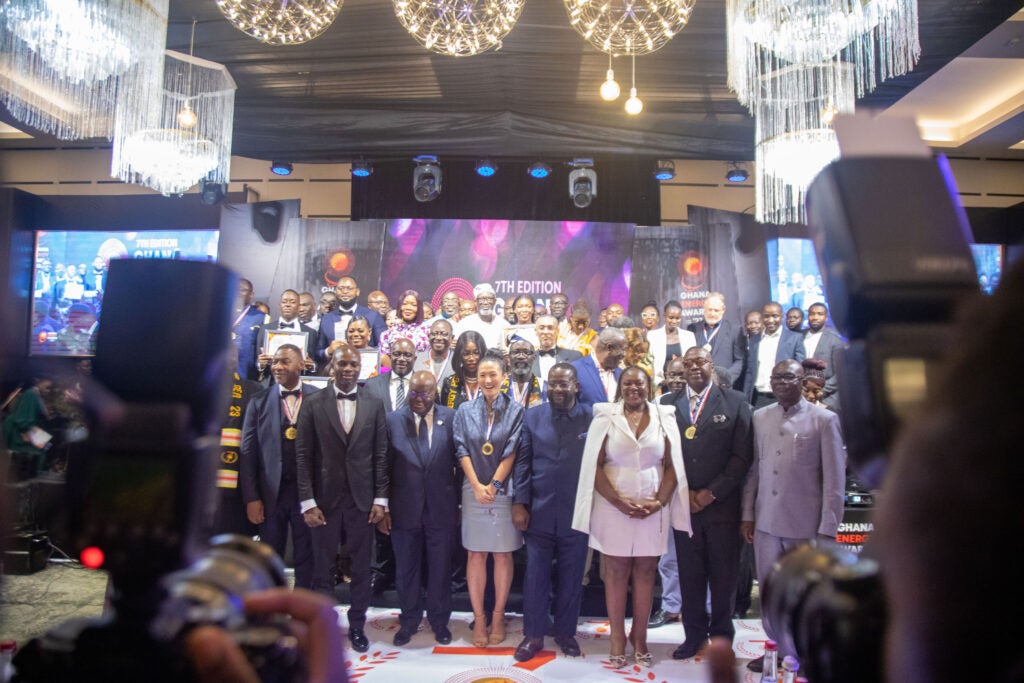
Celebrating Penn Graduate Student at the Ghana Energy Awards
Penn graduate student Justice Ohene-Akoto is honored at the Ghana Energy Awards where participants discussed the best way to bring Ghana to a sustainable, resilient, and inclusive energy future.
The 7th annual Ghana Energy Awards convened an illustrious gathering of thought leaders, policymakers, and industry experts in Accra, Ghana on 17th November 2023. This included Kleinman Center for Energy Policy grant recipient and Penn graduate student, Justice Ohene-Akoto, who was nominated for three awards: Energy Transition Most Valuable Player (MVP), Green Chief Trailblazer, and Innovation Project of the Project of the Year. The theme, “Ghana’s Energy Transition Framework: Sector Institutions as Building Blocks for the 2030-2040 Targets,” encapsulated the urgent need for a comprehensive approach to navigate the intricate challenges and opportunities within the energy landscape.
Amidst the distinguished guests of honor, including H.E. Dr. Omar Farouk Ibrahim of the World Energy Council and African Petroleum Producers’ Organization (APPO), crucial dialogues unfolded, spotlighting the evolving narrative surrounding Africa’s readiness to meet its Nationally Determined Contributions (NDCs) amid the impending COP28 discussions. The question echoed through the halls: Is Africa adequately equipped to deliver on the NDCs continually pledged at each COP gathering? This introspective query underscored the critical need for actionable strategies to fulfill climate commitments.

A prevailing sentiment emerged, emphasizing the necessity of a nuanced approach to the energy transition—one that does not dismiss all fossil fuels but rather advocates for a balanced utilization of diverse energy sources. APPO, for instance, expressed concerns about the predominant focus on immediately shifting from fossil fuels to renewables. Their stance aligns with Ghana’s ambition to navigate the energy transition while being mindful of the country’s historic minimal contributions to global emissions and the imperative to address prevailing energy poverty.
The multifaceted discussion highlighted the World Energy Council’s concept of the energy trilemma—ensuring energy security, availability, and environmental sustainability. It stressed the complexity of the challenges ahead: balancing the urgency of transitioning towards sustainable energy sources without exacerbating existing energy poverty. This balanced approach resonated, particularly as nations like Ghana grapple with the need for rapid progress while ensuring no one is left behind in the pursuit of a cleaner energy future.
Notably, the discourse also emphasized the shared responsibility of nations, especially developed economies, in supporting developing countries’ transition to greener energy. Hon. Monie R. Captan, Chairman of The Board Of Directors at Liberia Electricity Corporation, gave poignant remarks echoed the historical reliance of advanced economies on coal and fossil fuels to fuel their industrialization, stressing the obligation of these nations to contribute financially to developing green energy in the Global South. This call for equitable contributions became a cornerstone of the discussions, especially within the context of international climate negotiations.

Ghana’s President H. E. Nana Addo Dankwa Akufo-Addo’s pivotal announcement regarding Ghana’s Energy Transition and Investment Plan further underscored the nation’s commitment to a sustainable energy future. This strategic plan charts a course for achieving net-zero energy-related carbon emissions by 2060 and positions Ghana as a global frontrunner in energy transition, aiming for universal access to clean energy by 2030. The plan’s comprehensive nature outlines low-carbon solutions across major sectors of the economy, backed by essential investments, regulatory initiatives, and capacity-building measures.
Integral to Ghana’s success in this transition are robust sector institutions, as emphasized by Deputy Energy Minister Hon. Andrew Egyapa Mercer. Strengthening and empowering these institutions will be paramount in realizing long-term energy goals, especially considering Ghana’s role as an oil-producing nation and its responsibility in driving a sustainable energy transition.
The Ghana Energy Awards served as a pivotal platform, fostering nuanced discussions that highlighted the complexity of transitioning to cleaner energy sources while tackling socio-economic challenges. The insights gleaned reinforced the necessity for inclusive, balanced, and locally sensitive energy policies that harmonize global climate commitments with local developmental imperatives. Striking this delicate balance will be pivotal in steering Ghana and Africa towards a sustainable, resilient, and inclusive energy future.
